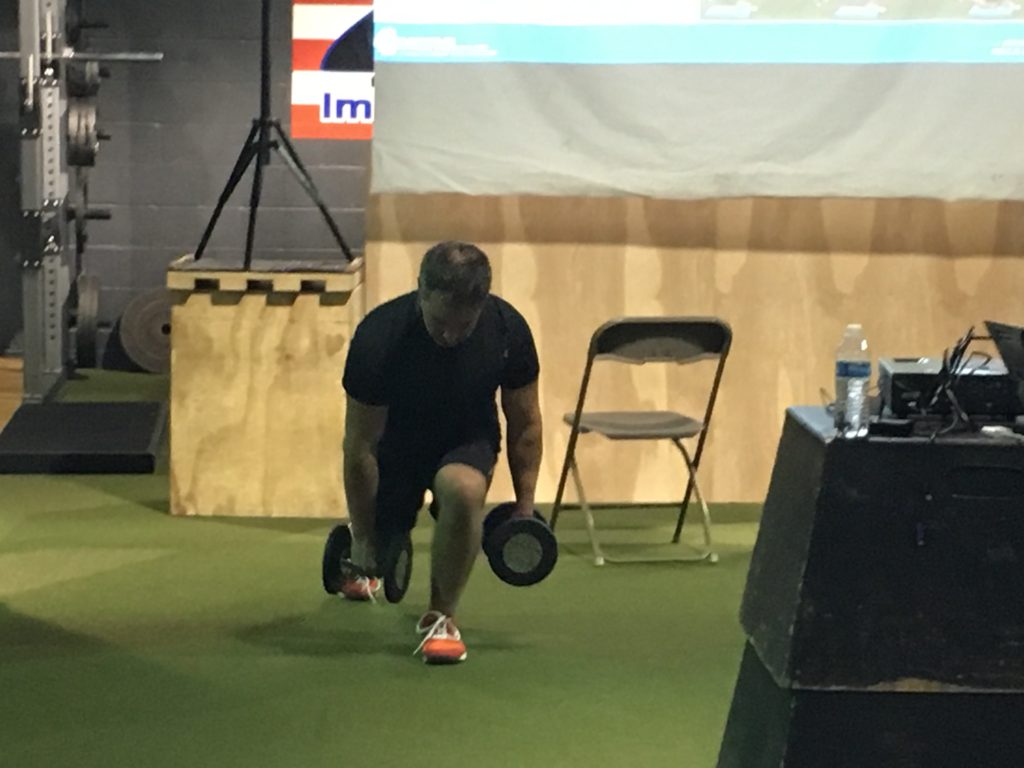Some exercises, we just hate. It doesn’t matter how much muscle they build, how many calories they burn, or how many muscle imbalances they solve.
For me, lunges have always sat pretty at No. 1 on my list of highly recommended, rarely performed exercises. I know they are amazing for both glute and quad strength and, as a marathoner-to-be, a pretty darn functional training exercise. But I don’t like them. My knees have their issues and are riddled with crepitus, that incessant popping and crackling that makes any exerciser paranoid.
So when, at this past weekend’s The Fitness Summit, Nick Tuminello, C.P.T., told all of the 180-some attendees (myself included) to stand up and perform a set of 15 lunges—albeit with a slightly different lunge form, our torsos leaned slightly forward—I was dubious. But I love Nick. He’s one of the incredibly smart people in the fitness industry that I trust, regularly interviewing him for my fitness articles. (He was just named the 2016 NSCA Personal Trainer of the Year! So well deserved!)
I did the lunges with the new-to-me lunge form. And, here’s the crazy thing: They didn’t hurt my knees. When I got back home, I had my boyfriend—who has infamously awful knees—try a few “regular” lunges and then some with Nick’s “lean forward” lunge form tip. “These feel so much better!”
RELATED: 4 Knee-Friendly Exercise Modifications For Knee Pain Relief
What gives? Without getting too technical into levers and moment arms, leaning forward slightly so that your shoulders are over your ankles removes some of the stress from your knees and quadriceps muscles while increasing the load on your hips and powerhouse glute muscles.
Of course, if killer quads are what you’re after, doing your lunges like this still works them, but not so much that if your quad strength isn’t awesome to begin with or if you have knee issues, you’ll have joint issues. Plus, shifting some of the focus to the glutes sounds fine by me. I mean, who doesn’t want to work their glutes more?
RELATED: Strength Training 101
My last “selling” point: As far as “functionality” goes, leaning slightly forward during lunges is great for runners. After all, you’re supposed to lean forward slightly at the ankles while running so that you “fall” forward with every stride. You don’t take each step with an erect torso. So why should you when you lunge? By leaning forward during lunges, you both get into the habit of assuming this position and work your glutes, quads, and knees in a movement pattern that’s specific to running. More specific = better performance. New lunge form for the win.
Try them out: Perform a lunge (forward or reverse), but keep your torso at about a 45-degree angle so that your shoulders are just above your lead knee. Do it with your body weight or a dumbbell in each hand, hanging perpendicular to the floor. At the end of the downward phase, the dumbbells should end up on either side of your lead ankle.
Give those a shot and let me know if they made as big of a difference for you as they did for me!
RELATED: Online and Personal Training with Aleisha
